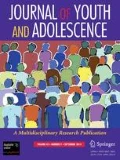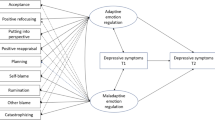Abstract
The objective of the present study was to examine relationships between cognitive emotion regulation strategies and depressive symptomatology across different types of life event. A sample of 138 secondary school students filled out a questionnaire. They were asked to indicate their most negative life event ever. On the basis of their answers, 3 types of negative life event were distinguished: loss, health threat, and relational stress experience. No relationship was found between type of negative life event and depressive symptomatology. Significant relationships were found between type of negative life event and the cognitive strategies self-blame and other-blame. Adolescents with a health threat experience scored higher on self-blame, while adolescents with a relational stress event scored higher on other-blame than the other groups. Significant relationships were also found between depressive symptomatology and the cognitive strategies self-blame, rumination, positive reappraisal, putting into perspective, and catastrophizing. No interaction effects were found between type of negative life event and cognitive strategies, suggesting that relationships between cognitive emotion regulation strategies and depressive symptomatology are consistent across different types of life event.
Similar content being viewed by others
REFERENCES
Aiken, L. S., and West, S. G. (1991). Multiple Regression: Testing and Interpreting Interactions. Sage, Thousand Oaks, CA.
Allen, S., and Gilbert, P. (1995). A social comparison scale: Psychometric properties and relationship to psychopathology. J. Pers. Indiv. Differ. 19: 193–299.
Anderson, C. A., Miller, R. S., Riger, A. L., Dill, J. C., and Sedikides, C. (1994). Behavioural and characterological styles as predictors of depression and loneliness: Review, refinement, and test. J. Pers. Soc. Psychol. 66: 549–558.
Arrindell, W. A., and Ettema, J. H. M. (1986). SCL-90, Handleiding bij een multidimensionele psychopathologie-indicator. Swets & Zeitlinger B. V., and Lisse.
Carver, C. S., Scheier, M. F., and Weintraub, J. K. (1989). Assessing coping strategies: A theoretically based approach. J. Pers. Soc. Psychol. 56: 267-283.
Compas, B. E. (1995). Promoting successful coping during adolescence. In Rutter, M. (ed.), Psychosocial Disturbances in Young People: Challenges for Prevention. Cambridge University Press, New York, pp. 247–273.
Compas, B. E., Orosan, P. G., and Grant, K. E. (1993). Adolescent stress and coping: Implications for psychopathology during adolescence. J. Adolesc. 16: 331–349.
Croyle, R. T. (1992). Appraisal of health threats: Cognition, motivation, and social comparison. Cogn. Ther. Res. 16: 165–182.
Derogatis, L. R. (1977). SCL-90: Administration, Scoring and Procedures Manual-I for the R(evised) Version. John Hopkins University School of Medicine, Clinical Psychometrics Research Unit, Baltimore.
Garnefski, N., Kraaij, V., and Spinhoven, P. (2001). Negative life events, cognitive emotion regulation and depression. Pers. Indiv. Differ. 30: 1311–1327.
Garnefski, N., Kraaij, V., and Spinhoven, P. (2002a). CERQ. Manual for the Use of the Cognitive Emotion Regulation Questionnaire: A Questionnaire Measuring Cognitive Coping Strategies. DATEC, Leiderdorp, The Netherlands.
Garnefski, N., Legerstee, J., Kraaij, V., van den Kommer, T., and Teerds, J. (2002b). Cognitive coping strategies and symptoms of depression and anxiety: A comparison between adolescents and adults. J. Adolesc. 25: 603–611.
Garnefski, N., Van den Kommer, T., Kraaij, V., Teerds, J., Legerstee, J., and Onstein, E. (2002c). The relationship between cognitive emotion regulation strategies and emotional problems: Comparison between a clinical and non-clinical sample. Eur. J. Pers. 16: 403–420.
Goodyer, I. M. (1990). Family relationships, life events and childhood psychopathology. J. Child Psychol. Psychiatry Allied Discip. 31: 161–192.
Greenberg, M. T., Domitrovic, C., and Bumbarger, B. (2001). The prevention of mental disorders in school-aged children: Current state of the field. Prev. Treat. 4.
Gross, J. J. (1999). Emotion regulation: Past, present, future. Cogn. Emotion 13: 551–573.
Kraaij, V., Garnefski, N., de Wilde, E. J., Dijkstra, A., Gebhardt, W., Maes, S., and ter Doest, L. (2003). Negative life events and depressive symptoms in late adolescence: Bonding and cognitive coping as vulnerability factors? J. Youth Adolesc. 32(3): 185–193.
Lazarus, R. S. (1993). Coping theory and research: Past, present, and future. Psychosom. Med. 55: 234–247.
Lazarus, R.S. (1999). Stress and Emotion: A New Synthesis. Springer, New York.
Nolen-Hoeksema, S., Parker, L. E., and Larson, J. (1994). Ruminative coping with depressed mood following loss. J. Pers. Soc. Psychol. 67: 92–104.
Seiffge-Krenke, I. (1993). Coping behavior in normal and clinical samples: More similarities than differences? J. Adolesc. 16: 285–303.
Seiffge-Krenke, I. (2000). Causal links between stressful life events, coping style, and adolescent symptomatology. J. Adolesc. 23: 675–691.
Sullivan, M. J. L., Bishop, S. R., and Pivik, J. (1995). The Pain Catastrophizing Scale: Development and validation. Psychol. Assess. 7: 524–532.
Thompson, R. A. (1991). Emotion regulation and emotional development. Educ. Psychol. Rev. 3: 269–307.
Author information
Authors and Affiliations
Corresponding author
Rights and permissions
About this article
Cite this article
Garnefski, N., Boon, S. & Kraaij, V. Relationships Between Cognitive Strategies of Adolescents and Depressive Symptomatology Across Different Types of Life Event. Journal of Youth and Adolescence 32, 401–408 (2003). https://doi.org/10.1023/A:1025994200559
Issue Date:
DOI: https://doi.org/10.1023/A:1025994200559



